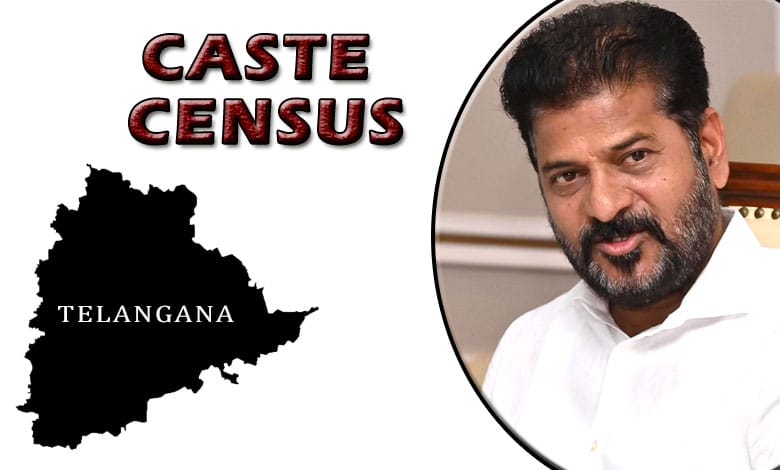Congress Pushes for National Caste Census: Revanth Reddy Advocates for Expanded Reservations and Social Equity
Congress is advocating for a national caste census, how it relates to Telangana’s ongoing caste survey, and the broader implications for social equity and resource distribution.

Hyderabad: As India prepares for its upcoming national census, the Congress party has raised an important demand: including a detailed caste count.
Telangana’s Chief Minister A. Revanth Reddy emphasized Congress’s commitment to push for a caste-based census that would enable expanded political, educational, and employment opportunities through increased reservations, even beyond the current 50% cap.
In this article, we’ll explore why Congress is advocating for a national caste census, how it relates to Telangana’s ongoing caste survey, and the broader implications for social equity and resource distribution.
Table of Contents
Congress’s Demand for a Caste Census in 2025
Speaking at the Children’s Day celebrations in Hyderabad, Telangana CM A. Revanth Reddy highlighted Congress’s commitment to force the central government to include caste data in the national census, scheduled for 2025. He argued that a caste-based census is essential for addressing historical inequalities by ensuring that political representation, educational access, and job opportunities reflect the diverse demographic makeup of the country.
Currently, India observes a 50% ceiling on reservations for Scheduled Castes, Scheduled Tribes, and Other Backward Classes. By including a caste count in the census, Congress aims to reassess this cap, allowing for more comprehensive quotas that would align with the demographic realities identified by a nationwide caste-based census.
Telangana’s State Caste Survey: Setting an Example
Telangana launched its own extensive caste survey on November 6, fulfilling an election promise made by Congress leader Rahul Gandhi. CM Reddy described this initiative as a “mega health checkup for society,” explaining that it aims to understand and address the socio-economic realities across castes in Telangana. According to Reddy, the survey’s purpose is to collect crucial data on community needs, enabling better-targeted welfare initiatives that cater to the state’s diverse population.
Also Read: CM Revanth Reddy Offers Support for Aditya Thackeray in Maharashtra, Slams Political Rivals as ‘Traitors’
Through this state census, Telangana is compiling data on caste, income, and other socio-economic factors, allowing the government to accurately allocate resources and enhance support for disadvantaged groups. The findings are expected to form a strong basis for advocating increased quotas and resources for underprivileged communities.
Addressing Concerns: Myths About Government Benefits
CM Reddy addressed prevalent concerns surrounding Telangana’s survey, countering misinformation that providing survey data could lead to a reduction in government benefits. Reddy assured citizens that, rather than limiting benefits, the survey will likely increase aid for eligible beneficiaries. The purpose of this data collection, he stated, is to ensure that resources are distributed equitably and that no deserving group is overlooked.
This state survey is an essential step toward a national caste census, as it underscores the potential advantages of detailed demographic data in designing policies for social equity. Accurate data could lead to enhanced schemes for education, healthcare, housing, and employment opportunities for various communities across India.
Caste Census as a Means to Socio-Economic Transformation
In advocating for a national caste census, the Congress party is pushing for a long-overdue reckoning with India’s socio-economic structure. By identifying the precise population distribution of various communities, the government can more effectively allocate resources and tailor policies to address existing disparities.
A caste-based census could reshape:
- Political Representation: Ensuring fair representation for all groups in legislative bodies, promoting a more inclusive democracy.
- Educational Opportunities: Expanding access to quality education, particularly for historically marginalized communities.
- Employment Quotas: Adjusting employment quotas to reflect current population demographics, potentially surpassing the 50% reservation cap to better support disadvantaged groups.
- Resource Allocation: Optimizing welfare schemes and government programs to meet the unique needs of different communities, providing more focused development initiatives.
Measures to Improve Education in Telangana
Highlighting Telangana’s commitment to social equity, CM Reddy outlined improvements in the education sector aimed at enhancing student welfare and curbing corruption. He reiterated that the state government has increased funding for food and other essentials in government residential schools, with strict accountability measures for quality control.
Those found providing subpar items to residential schools will face legal action, ensuring that resources meant for students’ welfare are used effectively. These educational improvements align with the state’s broader socio-economic survey efforts, as they prioritize the needs of marginalized communities by enhancing their access to quality education and resources.
Why Congress’s Caste Census Push is Important
A caste-based census aligns with Congress’s vision of a more equitable India, where all citizens have equal access to opportunities and resources. This data will allow policymakers to make evidence-based decisions that address caste-based disparities in a structured and transparent manner. By systematically understanding population demographics, Congress hopes to create a fairer system where welfare schemes, political representation, and employment quotas reflect the true needs of India’s diverse society.
Conclusion: Paving the Way for an Inclusive India
As the country moves toward the 2025 national census, Congress’s push for a caste-based count has the potential to transform India’s socio-political landscape. Telangana’s ongoing caste survey serves as a pilot for how data-driven policies can promote social equity and economic empowerment.
Through an inclusive approach that recognizes the complexities of caste, the Congress party aims to establish a foundation for equitable resource distribution, creating a more balanced India for future generations.
